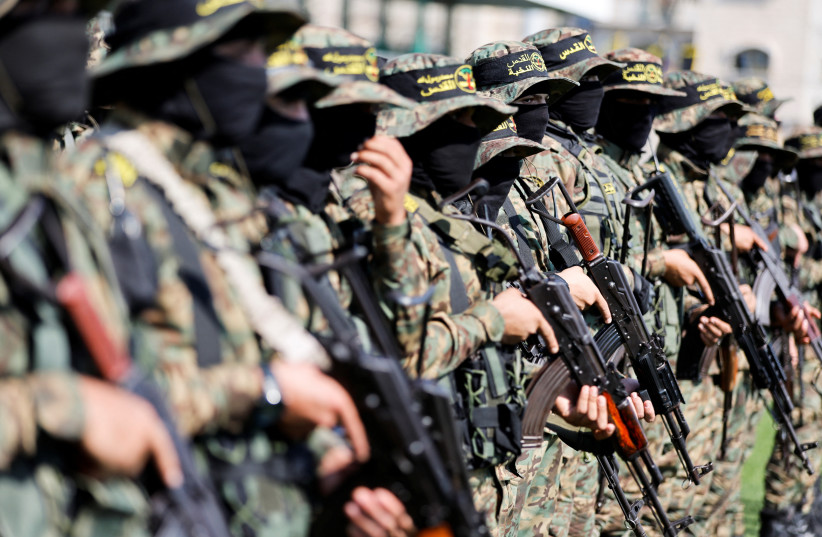Hours after the ceasefire in the Gaza Strip went into effect on Sunday night, Hamas and Islamic Jihad announced they would not allow Israel to drive a wedge between the two groups.
Palestinian sources in the Gaza Strip, however, insisted that the already tense relationship between Hamas and Islamic Jihad have been further strained by the weekend war with Israel that began on Friday afternoon.
“Many Islamic Jihad supporters are disappointed and feel betrayed because Hamas did not join the fighting,” one of the sources said on Monday. “Senior Hamas and Islamic Jihad officials did not even talk to each other directly during the three days of fighting. They were communicating only through external parties, especially Egypt and Qatar.”
“Senior Hamas and Islamic Jihad officials did not even talk to each other directly during the three days of the fighting. They were communicating only through external parties, especially Egypt and Qatar.”
Palestinian sources in the Gaza Strip
Hamas has come under attack by other Palestinians for failing to join Islamic Jihad and other armed groups in firing rockets at Israel.

Hamas’s critics accused it of throwing Islamic Jihad under the bus by not joining the fighting. They claimed that Hamas, which has been ruling Gaza since 2007, did not want to engage in another major military confrontation with Israel out of fear of losing control over the coastal enclave.
Hamas, they added, is aware that the Palestinians in Gaza are not ready for another war, in light of the heavy price they paid during last year’s Israel-Hamas war.
Other critics of Hamas claimed that its leaders were not really sorry to see their competitors in Islamic Jihad, the second-largest armed group in Gaza, be dealt a severe blow as a result of the IDF’s military strikes.
Over the past few years, reports in several Palestinian and Arab media outlets have referred to rising tension between Hamas and Islamic Jihad.
According to the reports, Hamas is unhappy that Islamic Jihad is becoming a dominant and independent force inside Gaza.
The tensions reached their peak last year after sources there revealed that members of Hamas’s Izzadin al-Qassam Brigades detained Islamic Jihad militiamen who were planning to launch rockets toward Israel.
Hamas, the sources said, was also worried about the growing cooperation between Islamic Jihad and other terrorist groups inside Gaza, including those linked to the Fatah faction, the Popular Front for the Liberation of Palestine, the Democratic Front for the Liberation of Palestine, as well as tiny Islamic State-inspired cells.
Leaders of Hamas and Islamic Jihad held a series of meetings over the past few months in Gaza and Lebanon, as part of an attempt to ease the tensions and restore the military and civilian cooperation between the two sides.
The two groups are now claiming that one of Israel’s main goals behind Operation Breaking Dawn was to set them against each other, and that the talk in Israel about Hamas’s decision to sit on the fence during the fighting aims to “sow discord and division” among the Palestinians.
In keeping with this claim, the leaders of Hamas and Islamic Jihad are now boasting that they actually managed to thwart the alleged Israeli conspiracy to create dissension among the Palestinians.
That’s why it was important for Hamas leader Ismail Haniyeh and other leaders of his group to call the families of the Islamic Jihad members who were killed during the fighting to offer their condolences.
The Hamas leaders also went to extreme lengths to emphasize the importance of maintaining a “unified front” in the battle against Israel, to show that their relation with their Islamic Jihad “brothers” remains as strong as ever.
The assessment among Palestinians in Gaza is that Hamas has emerged as one of the winners from the Israel-Islamic Jihad confrontation. Hamas succeeded in presenting itself both as a mediator and “responsible adult.”
Hamas has good reasons to feel confident
- Unlike Islamic Jihad, it did not suffer any civilian or military losses, as it was not targeted by Israel during the fighting.
- Hamas again managed to reassert its role as a major player in all matters related to Gaza. The Egyptians, Qataris and UN mediators dealt with the Hamas leaders as if they were the legitimate and sole rulers of the Gaza Strip.
- By staying away from the fighting, Hamas acted as the “responsible adult” that places the interests of its people above other considerations.
- Islamic Jihad’s ability to pose a real threat to Hamas’s rule over the Gaza Strip has suffered a setback in light of the elimination of a number of senior Islamic Jihad commanders and the tremendous damage caused to its weapons arsenal.
- Hamas can now take credit for saving Islamic Jihad from being totally destroyed by Israel.
Hamas is now hoping to reap the fruits of its new role as the “responsible adult.” The ball, as far as Hamas is concerned, is in the Israeli court. Hamas is not going to recognize Israel, but the events of the past few days have again shown that its desire to stay in power remains its No. 1 priority.
